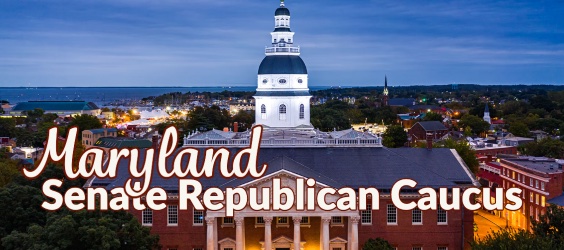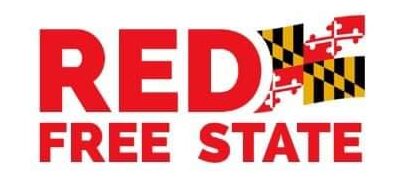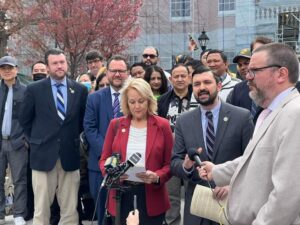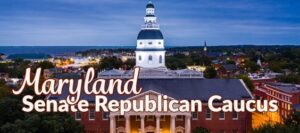Senate Republicans “FY 25 Budget Update & Potential Tax Increases”

Next week, the full Senate will consider the FY25 Budget. Since Governor Moore made his initial budget proposal in January, the Senate Budget & Taxation Committee has been making changes that will be presented to the full chamber.
On Thursday, the Board of Revenue Estimates revised its FY24 and FY25 estimate, and Maryland is now projected to receive $255 million less over the next two fiscal years. This is a harbinger of more challenging budget years ahead, as spending mandates, mainly the Blueprint, are weighing down the State spending. This write-down was not unexpected and is incorporated into the current version of the Budget, however, it has inspired a renewed conversation around tax increases.
Potential for Tax Increases – Senate vs. House
Senate Leadership continues to stand by their commitment to not pass any tax increases this year, however, with a month left in Session, anything is possible.
Across the street in the House, Democrats have proposed a slew of significant tax increases that will impact the daily lives of every Marylanders. Proposed revenue increases include higher vehicle registration fees, higher tolls, a surcharge on online shopping deliveries as well as the expansion of sales tax to services (see HB 1515) provided by mechanics, hair stylists and barbers, funeral homes, accountants, dog walkers, realtors, attorneys, landscapers, veterinarians and much, much more. If passed, Marylander’s won’t be able to get through their daily to-list without having to pay taxes.
Our members are closely watching the tax increases proposed in the House and are prepared to fight against them should they move to the Senate.
Maryland Matters: House and Senate take sides on tax increases after revenue write-down
Juvenile Justice Bill Advances
SB 744 is the long-awaited juvenile justice bill supported by the Senate President, Speaker of the House and Governor Moore. The Senate and House version of the bill have both passed their respective chambers, and now differences between the bills are being worked in a conference committee before the matching version of the bill must be passed by both chambers before going to Governor Moore for signature.
Here is a summary of the major differences between the bills:
SB744 (Senate Version)
Requires children ages 10 to 12 who are charged with the crime of motor vehicle theft to be the subject of a Children in Need of Supervision petition, also known as CINS. Requires a law enforcement officer to submit a CINS petition so that the youth and youth’s family can qualify for a variety of services.
Requires the state Board of Victim Services to distribute information about CINS.
Requires the court to receive a progress report for a child on probation who has four or more unexcused absences from a “treatment program” that was ordered by the court.
Requires that the commission include five people from the general public, a representative from the state Department of Education and two from the Consortium on Coordinated Community Supports, which is responsible for developing a statewide framework to expand access for behavioral health services for Maryland students.
Legislation would go into effect Oct. 1 (however, the commission would be formed in time to hold its first meeting by July 1).
HB 814 (House Version)
Requires the 23 county and Baltimore City school boards to offer alternatives to a public school education for a youth registered as a juvenile sex offender. This stems from a Fox-45 that a 15-year-old pleaded to second-degree rape and was able to attend a public high school in Baltimore.
Requires children ages 10 to 12 to enter a mandatory diversion program if a first-time arrest involves a car theft or certain firearm offenses.
Permits a “good cause” provision for a child on probation to have two unexcused absences from a rehabilitation program.
Requires that the commission include seven people from the general public, one local school superintendent and one school principal.
Legislation would go into effect Jan. 1, 2025 (however, the commission would be formed in time to hold its first meeting by July 1).
Our members were encouraged that the proposal offered real accountability for juvenile offenders as well as the Department of Juvenile Services, and as the bill has moved through the legislative process, we are glad that these elements have remained.
Two out of three proposals in the Joint Republican Caucus’ Juvenile Justice Restoration Act (SB 52) are now included in this bill, including requirements that:
juveniles younger than 13 who use firearms in the commission of a crime will come under the jurisdiction of the juvenile court system.
upon the child’s third arrest for a crime that does not fall within the category of “crimes of violence” or a crime committed with a firearm, the child will come under the jurisdiction of the juvenile court system.
This would help eliminate the “catch and release” of juveniles repeatedly apprehended for repeatedly committing nonviolent crimes like car theft.
The one element that was not included from the Republican proposal was amending the Juvenile Interrogation Act passed in 2022 that requires an attorney to be present for a juvenile to be questioned, even if their parent has consented.
The Republican bill would allow parental consent as a substitute for the required consultation with an attorney. Floor amendments were offered to implement this into SB 744, and despite receive bipartisan support, they failed.
Maryland Matters: Juvenile justice reform bills approved, work to resolve differences begins
Transportation Equity, Fairness and Privacy Act Hearing
Senate Minority Whip Justin Ready presents the Transportation Equity, Fairness and Privacy Act
Last week, Senate Minority Whip Justin Ready presented the Transportation Equity, Fairness and Privacy Act (SB 841/HB 1025) in the Senate Budget & Taxation Committee.
This bill is part of the 2024 Joint Republican Legislative package. As the state reexamines its transportation infrastructure and how it is funded through the TRAIN Commission, SB 841/HB 1025 ensures that all users of our transportation systems pay their fair share and citizens’ privacy is maintained.
The Transportation Equity, Fairness and Privacy Act:
Eliminates the automatic gas tax increase where Maryland’s tax is raised every July 1st based on inflation. This has been a long-standing Republican priority.
Reestablishes Fare Box Recovery requirements for public transportation, and
Establishes privacy standards to prevent the creation of Vehicle Miles Traveled tax or fee
Blueprint Accountability and Flexibility Act of 2024 Hearing
On Wednesday, the Blueprint Accountability and Flexibility of 2024 (SB 1062/ HB 1432) received a hearing in the Senate Education, Energy and Environment Committee. This bill is part of the Joint Republican legislative agenda this Session.
The Blueprint Accountability and Flexibility Act of 2024 provides stronger accountability for how nearly $4 billion in taxpayer funds are spent each year on public education, and also gives local school districts more time and flexibility to implement new Pre-Kindergarten programs.
This bill follows multiple reports of misspending in public education and addresses concerns from local school districts about not being able to implement Kirwan requirements under the current timeline.
BOOST Students Visit Annapolis
On Tuesday, we were pleased to welcome students receiving BOOST (Broadening Options and Opportunities for Students Today) scholarships for their advocacy day in Annapolis. BOOST is Maryland’s only school choice program that offers scholarships for low-income students to attend non-public schools. Supporting school choice and the BOOST Program, has been a priority of the Joint Republican Caucus. SB 552 – Operating Budget – Funding – Scholarships for Nonpublic School Students would codify BOOST and secure its future.
Funding for BOOST was successfully restored in 2023, and Governor Moore’s FY25 budget proposal includes $9 million in funding. If passed, SB 552 would ensure that low-income families who receive this critical lifeline for the long term and would no longer have to worry year after year if the program will continue. SB 552 also increases funding for BOOST to $16 million annually by FY29.
Stay connected throughout the 90-Day Legislative Session. Use the following links to find your elected officials in Annapolis, track legislation, watch floor and committee sessions and more!






